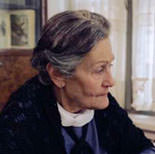 Anna Hedvig Büll (born Anna Hedwig Bühl, (February 4, 1887 – October 3, 1981) was an Estonian missionary of Baltic German extraction who helped to save the lives of several thousand Armenian orphans during the Armenian Genocide.
Anna Hedvig Büll (born Anna Hedwig Bühl, (February 4, 1887 – October 3, 1981) was an Estonian missionary of Baltic German extraction who helped to save the lives of several thousand Armenian orphans during the Armenian Genocide.
While visiting her family in Haapsalu in 1903 she was inspired by a lecture given by a well-known evangelist Johann Kargel in her father’s house and decided to dedicate her life to humanitarian mission work.
After receiving her baccalaureate in 1903, Büll spent some time at the Mission House Malche in Bad Freienwalde (Oder) where she learned about the fate of Armenians in the Ottoman Empire. Motivated by her desire to work among the Armenian people she continued her studies at an evangelical school. Soon she was invited to work at an Armenian mission station in Maraş, however, due to her youth she was first sent to work with women and children in German villages and then for a few months with the poor in Saint Petersburg.
In 1909, Büll again attempted to go to work with Armenians, however, this time her trip was put on hold by the Adana massacre in Cilicia. Instead, Büll attended for two years a seminary for missionary teachers. After finishing her studies, Büll was finally able to proceed for Cilicia where she worked as a teacher at an Armenian orphanage in Maraş between 1911 and 1916. In 1915, Büll witnessed the Armenian Genocide in Cilicia and was instrumental in saving the lives of about two thousand Armenian children and women when Maraş was turned into “The City of Orphans”. Büll was recalled from Maraş in 1916.
In 1921, Büll was sent by the newly founded Action Chrétienne en Orient to Aleppo, Syria, where she established a refugee camp for the survivors of the Armenian Genocide. She also organized medical help for plague victims and the construction of two hospitals. Büll organized the establishment of weaving shops, gardens, an Armenian language school, and other enterprises to better the lives of the refugees.